7 Unforgettable Experiences Volunteering at the
Surin Elephant Project
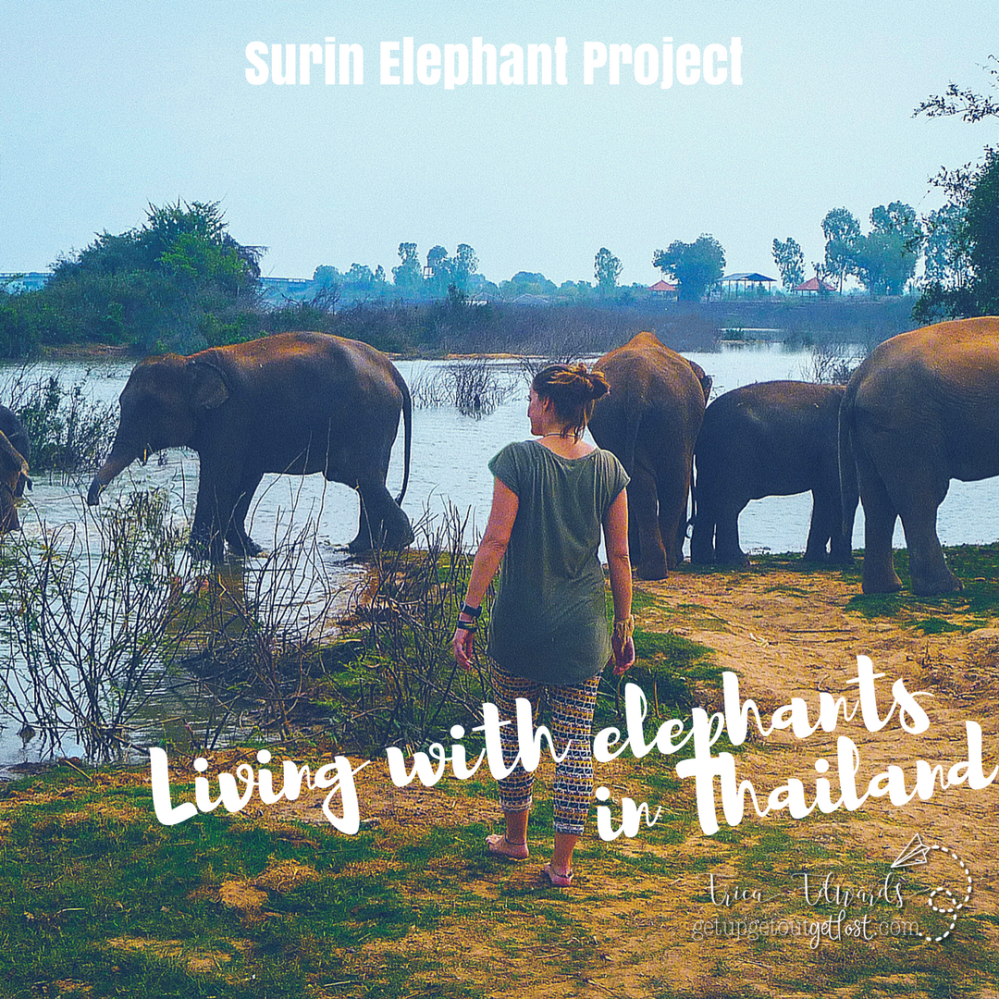
Tossing and turning against the stifling heat, I rolled over on the thin mat, trying to make myself comfortable in the raised bamboo hut. Tired and hot as I was, I couldn’t help but smile as I listened to the muffled squeaks and rumbles below.
Elephants.
The beautiful, majestic creatures that had fascinated me since childhood, of whom I had seen countless documentaries of their incredible memories, near-human emotional intelligence and fascinating beauty…
And here I was, living amongst them.
Surin Project
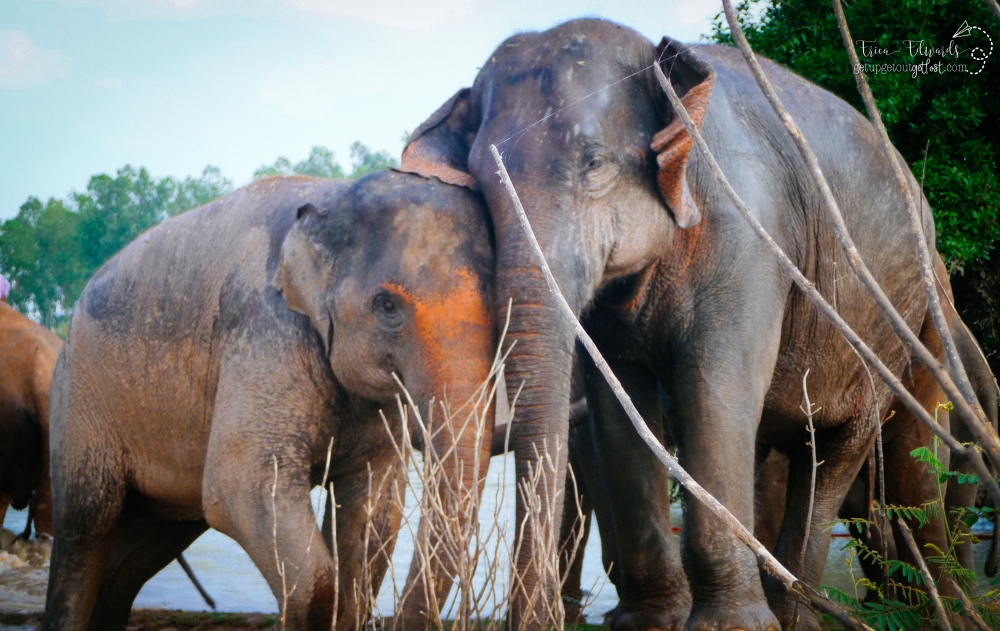
The Surin Project in an Asian elephant conservation project located in Baan Tha Klang in northeast Thailand (near the Cambodian border), and managed by the Save Elephant Foundation (SEF), the same NGO that runs the world famous Elephant Nature Park in Chiang Mai.
The Surin Project is dedicated to protecting Asian elephants in the Surin province and taking steps toward enabling captive elephants to thrive and enjoy a more natural lifestyle.
I spent two months living in Baan Tha Klang, and it is an experience that will forever be etched into my heart. Walking amongst these gentle giants, splashing around with them in the river and simply witnessing them be are just a few of the incredible aspects of the Surin Project, a truly unforgettable encounter.
Seven Unforgettable Experiences
Volunteering at the
Surin Elephant Project
1. Thai Blessing Ceremony
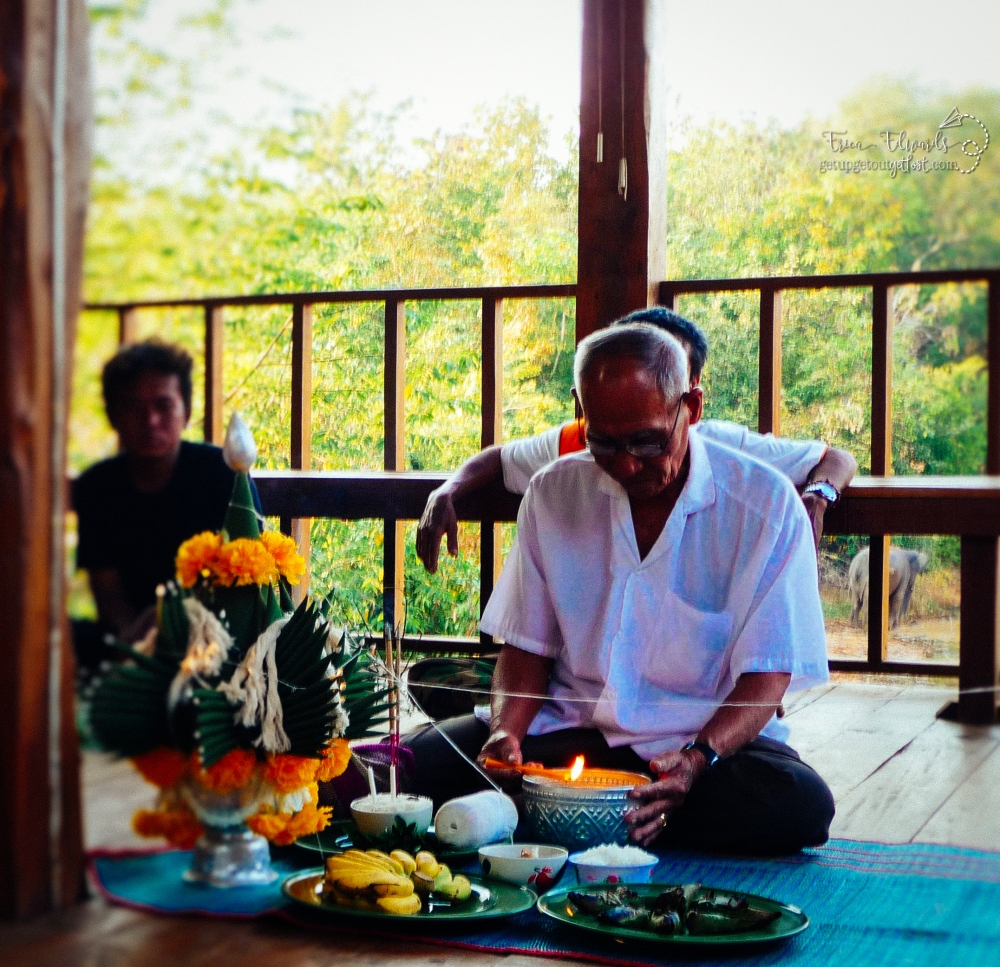
Upon arrival at the Surin Project, we gathered into the outdoor terrace that overlooks the elephant “playground” – an area reserved for the elles to interact freely together, complete with trees to shade them from the scorching Surin sun and mud pools to splash, play and cool their majestic bodies.
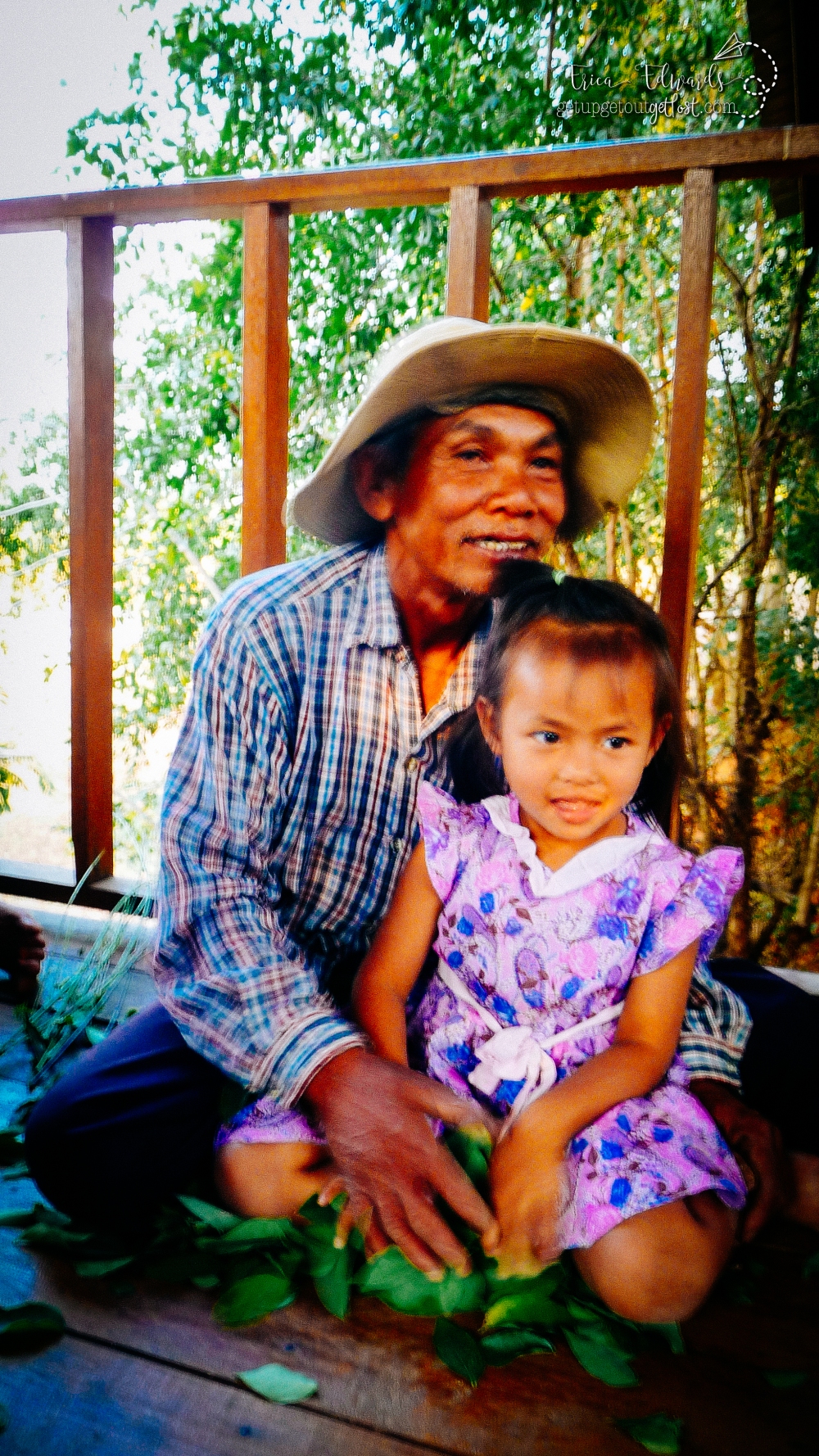
The mahouts (elephant caretakers, whose role is passed down from father to son) and their families were present, as was the village holy man. The sun was just setting, the sky alight with orange and pink flashes crowning the forest in the distance. We sat together in a circle, legs crossed and palms together as the holy man recited a blessing, welcoming us to the village and wishing us peace and safety during our stay.
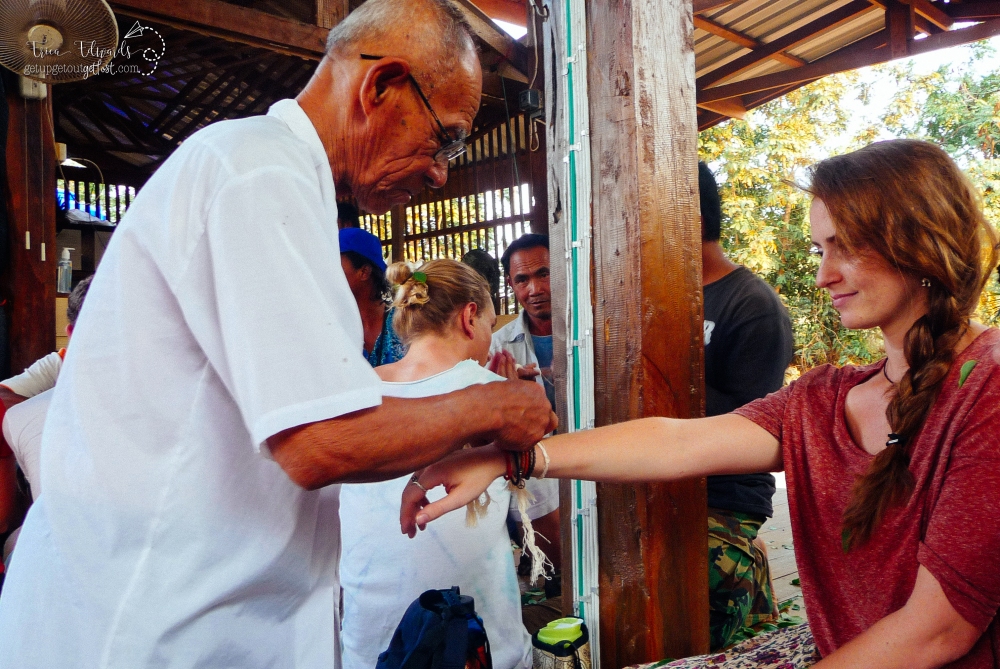
Sai sin sacred threads were blessed and individually tied around each of our wrists to protect us during our stay in Baan Tha Klang. Fragrant leaves and holy water were sprinkled upon us by the local children and holy man, and a tall glass of strong, Thai whiskey was passed around to seal the ceremony.
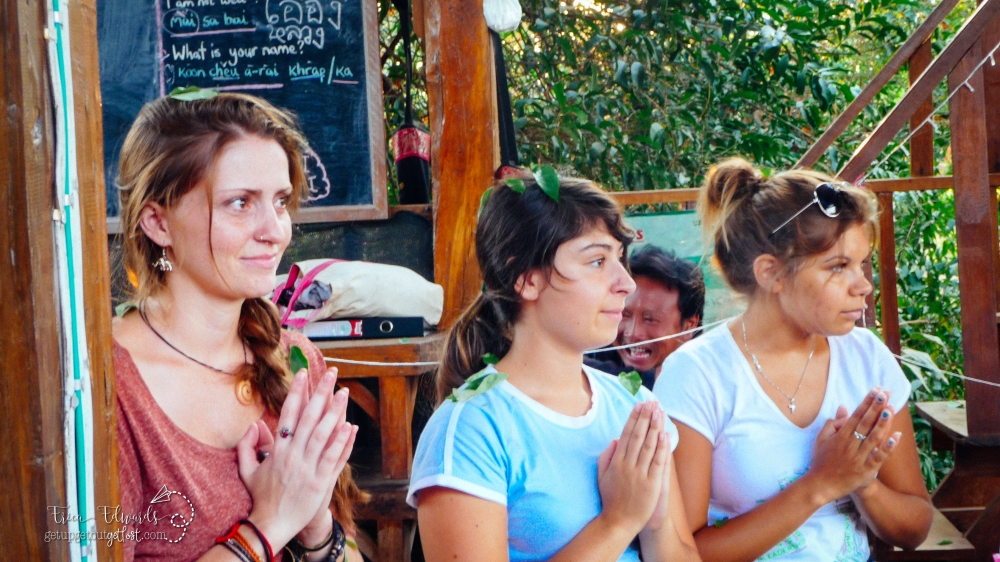
Surin is far off the beaten path for most people travelling in Thailand, and this beautiful ceremony is just one glimpse into the cultural immersion we experienced during our stay.
2. Sunrise & Drowsy Elephant Sighs
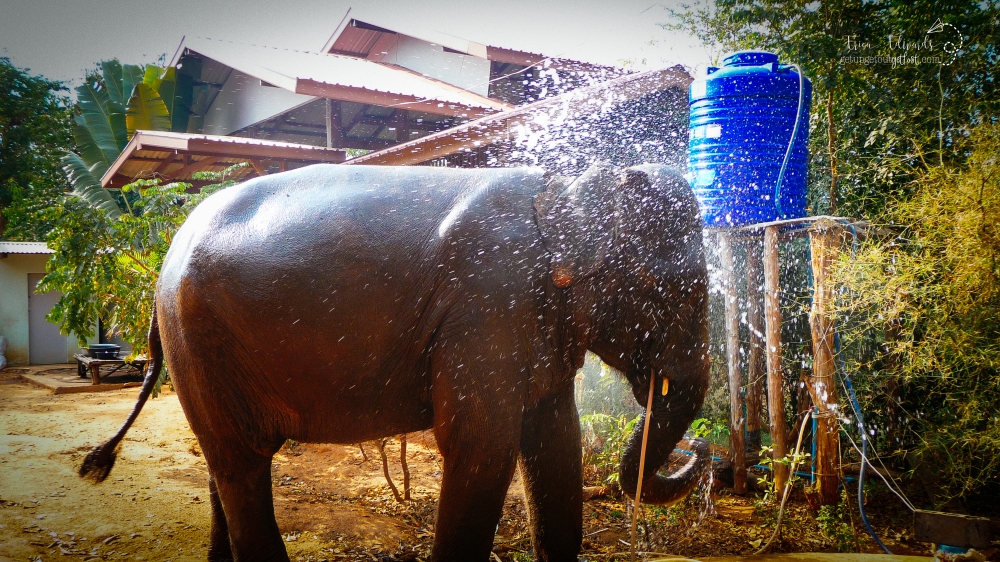
There are nearly 200 elephants in Surin Village, and they surround you from every direction. You drift off to sleep with the rumble of their enormous bodies settling in for a nights’ rest, and their deep exhalations as they find the sweet spot to lay their heavy heads for the evening.
In the morning, Surin wakes up early and as the sun begins to peak through the bamboo slats, the rumbles below bring you back to reality. Each morning I would spring to the little window in my humble room and rub my sleepy eyes in awe of the incredible creatures all around me.
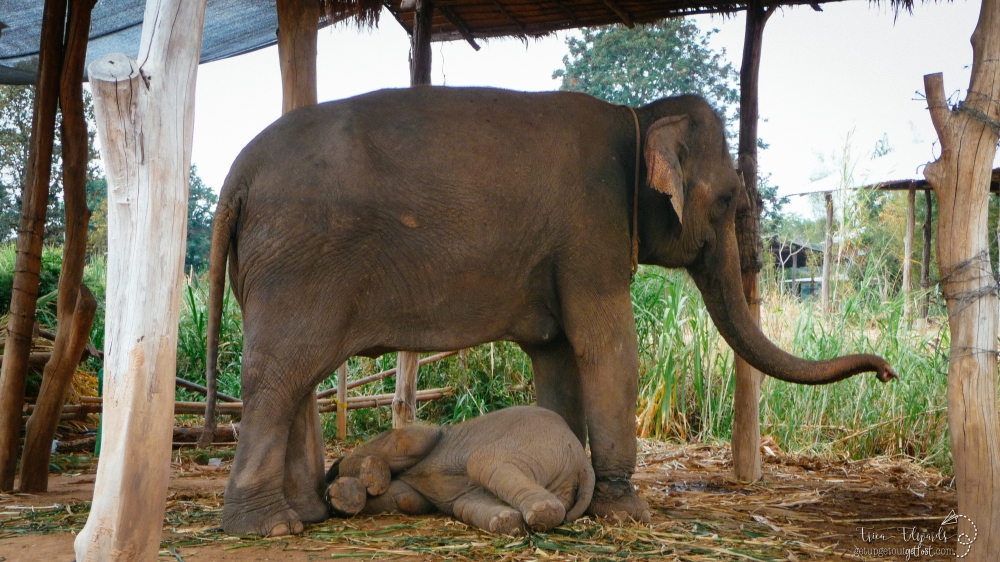
Elephants, as far as the eye can see having their breakfast of cucumbers and sugar cane, or being given a quick morning bath by their mahouts to loosen the red earth from the deep lines and folds of their skin.
Climbing down the ladder to the shaded area beneath the raised hut, my host mother would prepare strong, black coffee to start the day, always with enough sugar to make me wince on my first sip – as is the taste in sweet-toothed Thailand.
Sipping my gafae beneath that bamboo hut as the morning sun baked the village around me, watching these majestic creatures splash the morning sleep from their sage eyes is a memory that will forever live within me.
3. Walking Amongst Giants
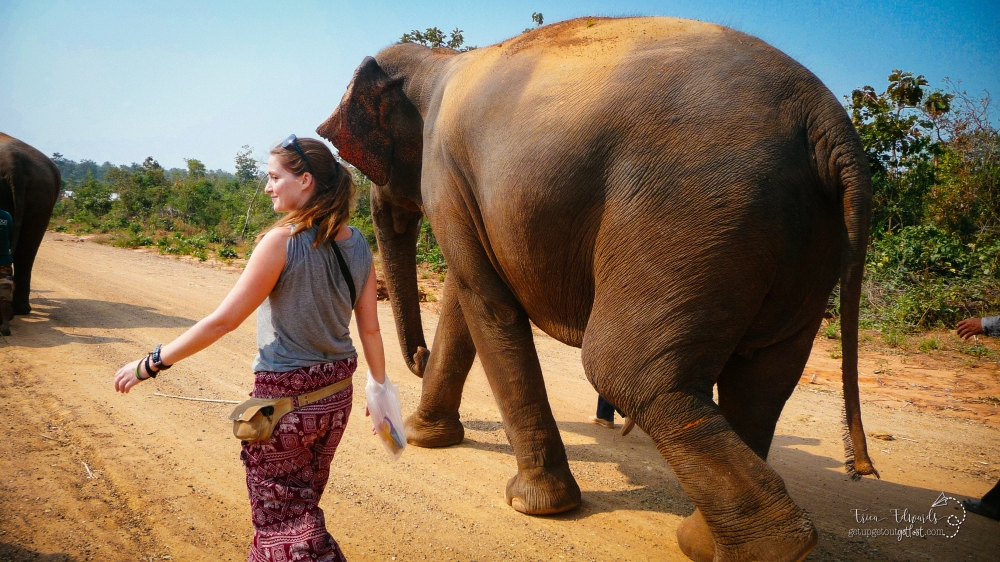
Each day, we’d join the elephants and their mahouts on long, leisurely walks through the surrounding forests. Side by side strolling along under the shade of the trees, our meager bodies overshadowed by the powerful creatures lumbering beside us.
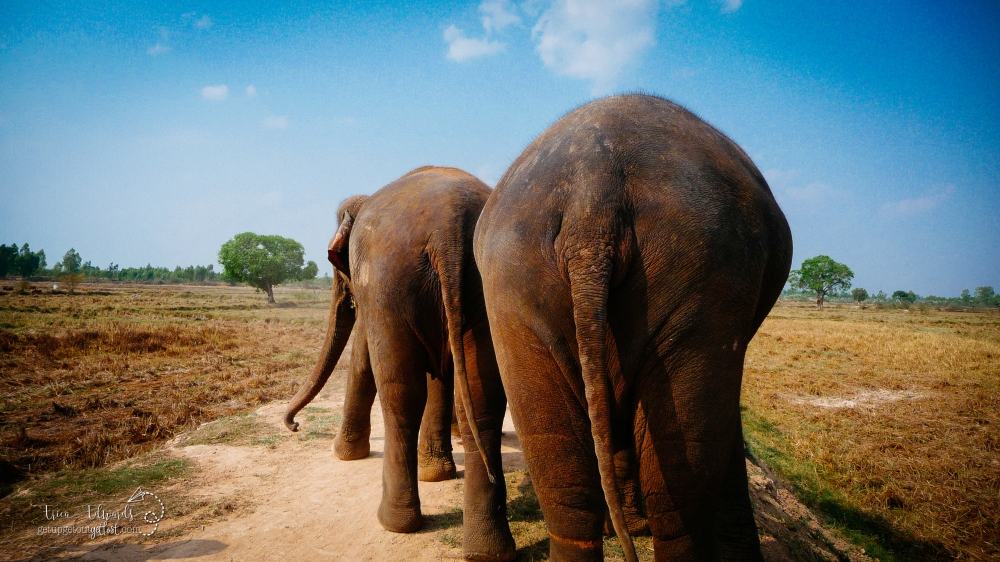
Their interactions here were evidence of the elephant’s keen emotional intelligence, considered to be the closest to humans of all earth’s beings. Some were inseparable, shuffling along side by side or in a line “holding hands” from trunk to tail. It was clear which elephants were friends, which weren’t, and which were fiercely independent.
Tangmo, the most independent of the group, would trot off happily at the first sight of water, crashing clumsily into the river as her mahout followed along, resigned to her antics and lazily trying to coax her back into the pachyderm parade.
Walking side by side along the elephants of the Surin Project can be likened only to walking through a dream, a truly ethereal experience.
4. Bathing Beauties
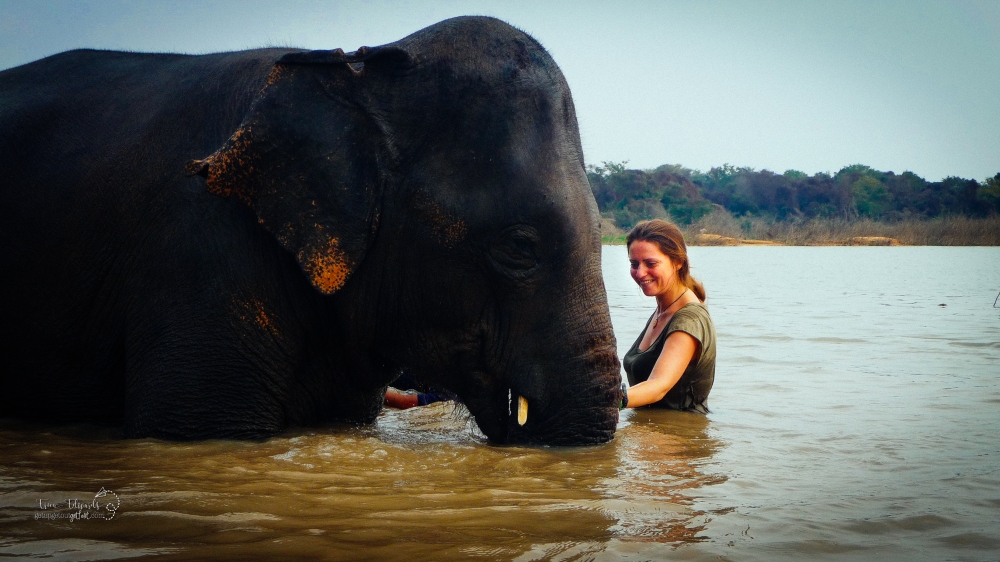
As we reached the river after a long wander, the elephants would eagerly edge toward the water, excited to refresh their enormous bodies in the cool river and to wash the red dirt of Surin from their deep lines and cervices.
Each of the volunteers would be loaded with a giant bag of cucumbers (a favorite among the elles) coaxing them deeper into the water with a bath time snack. They hungrily grabbed the cucumbers from our hands, their strong, skillful trunks stuffing 1, 2, 3 cucumbers into their mouths at a time as they wiggled themselves ever deeper beneath the surface of the water into the cool mud below.
Bliss.
Following the lead of the mahouts, we helped to bathe the beauties, scrubbing behind their ears and hard-to-reach-places as they wriggled and squirmed with delight. Standing so closely beside their magnificent frames, both of us submerged in water, I felt at once defenseless beside the magnitude of the creature beside me, yet at the same time at complete peace and utter joy at the proximity.
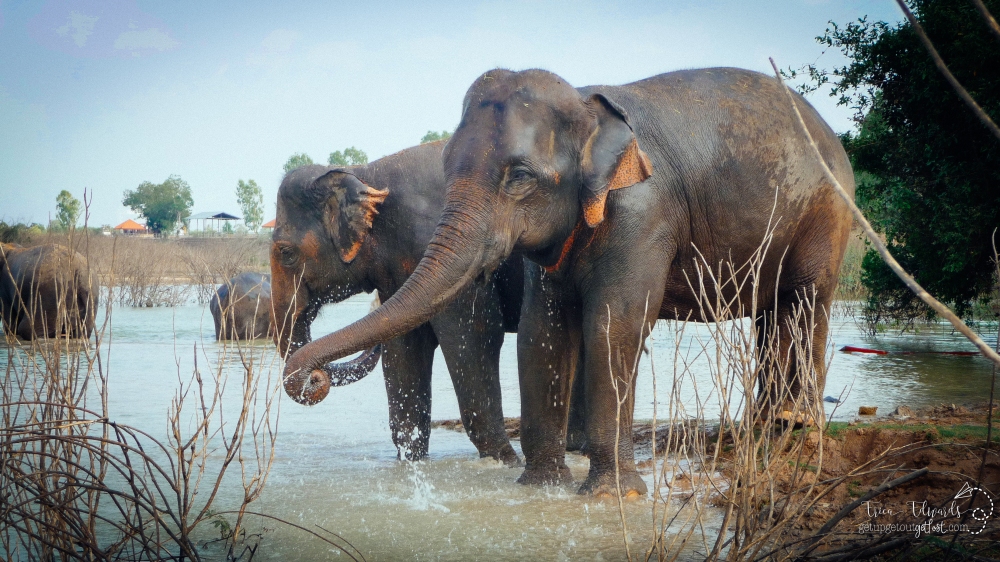
Once their bodies were cleaned, they were left a while to play together, splashing and blowing bubbles like children in the sea, as we looked on in amazement.
5. Observing Love in the Air
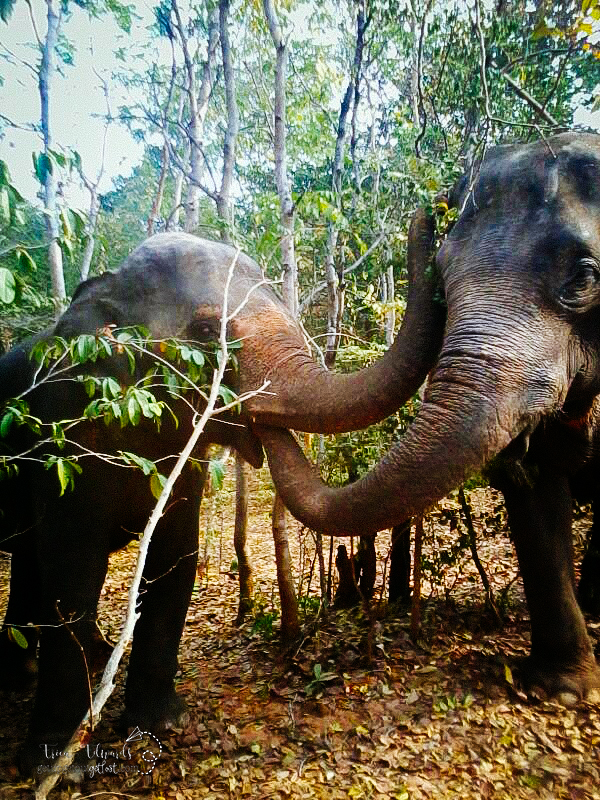
When we think of the sound an elephant makes, me often recall the thunderous trumpeting we’ve seen time and again in films. In reality, happy elephants rarely make this sound, their soft and playful personalities opting for a softer, sweeter vocalization.
On my first morning at the Surin project, I watched as two young elephants trotted toward one another, squeaking and cooing, wearing an expression that can only be described as smiling. They caressed one another, intertwining their strong trunks and nuzzling in delight. These elephants, we were told, were best friends and though they saw one another every day, this was always their reaction.
Later on, we noticed Nonglek, WongDuean and Warin playing together in the elephant enclosure. They meandered from one part of the enclosure to the next, always side by side like a group of gossiping grannies, linking trunks rather than arms. We soon learned that this was nothing new for these three inseparable friends, who always walked shoulder to shoulder or trunk to tail, rarely breaking the trifecta.
Elephants are known for their incredible levels of emotional intelligence, and witnessing the friendships formed within this small subgroup was not only fascinating, but made me fall even more deeply in love with the gentle beasts.
6. Mahout Olympics & Camping
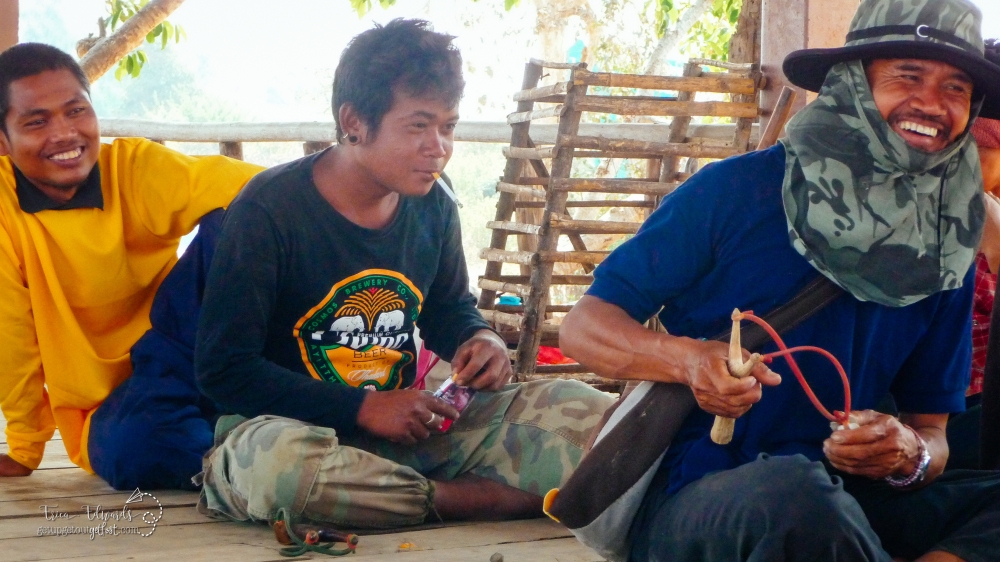
On my final evening at the Surin Project, we packed our tents and headed out of the village and along the river – an afternoon stroll with the elephants and their mahouts.
This day and night were meant to be a celebration, a farewell and a final opportunity to enjoy each other’s company before we said goodbye to our little piece of elephant paradise.
After bathing the gentle giants in the river to cool off from the long walk, tents were pitched and the “Mahout Olympics” were launched – a series of challenges based off of traditional Thai games and competitions, like Mak Meb (a game that involves tossing and catching pebbles with one hand), shooting a slingshot, and shaping hats and shoes from banana leaves.
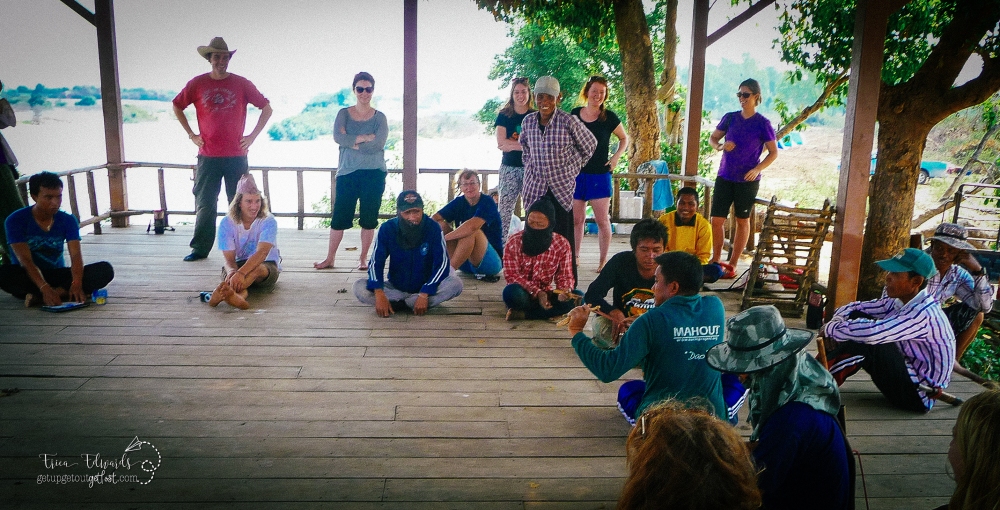
Mahouts and barangs (foreigners, in Thai) teamed up and we spent the afternoon laughing and playing in the red dirt of Surin until the winners were determined and the losers faced their fate – doused in flour and forced to sing and dance for us beneath the setting sun.
As twilight neared, campfires were built, dinner was grilled, and bottles of Chang beer and Hong Thong Thai whiskey were popped. “Chon gâew!” (Cheers!) we clinked cups in celebration of the incredible time we’d spent in Surin, and talked and laughed beneath the stars until the wee hours of the morning.
All the while, the twelve gentle giants sponsored by the Surin Project enjoyed their own pachyderm pajama party, snuggling together and snoozing beside the river just outside of our campsite. If that’s not what dreams are made of, I’m not sure what it.
7. A Rude Awakening
Not everything in Surin Village is an elephant fairy tale. In fact, one of the things that sets the Surin Project apart from elephant sanctuaries like the world renowned Elephant Nature Park (ENP) in Chiang Mai is that in Surin, you’re forced to see what happens to the elephants who aren’t lucky enough to have been saved from a life of labor.
The Surin Project is housed within Baan Tha Klang, an area with over 180 registered elephants – most of whom are forced to perform in the local circus and/or used to give elephant rides to tourists who (assumingly) are uneducated about the torture and anguish that goes into these practices. These images of abused elephants surround you every day, forcing you to see why the work of the Save Elephant Foundation (SEF) is so imperative, and giving you deeper understanding of why this work is so important.
I’ll never forget the image of an elephant being beaten by a bull hook before my eyes, or the look of exhausted desperation in the eyes of a small elephant carrying a family of oversized tourists on his back under the sweltering Surin sun.
It’s not a fairy tale, and it can be painful to witness. But these sights are seared into my memory like a scar, and it is because of these blemishes that I remain steadfastly passionate about the importance of protecting these gentle, graceful giants.
Asian Elephant Conservation:
Useful Links
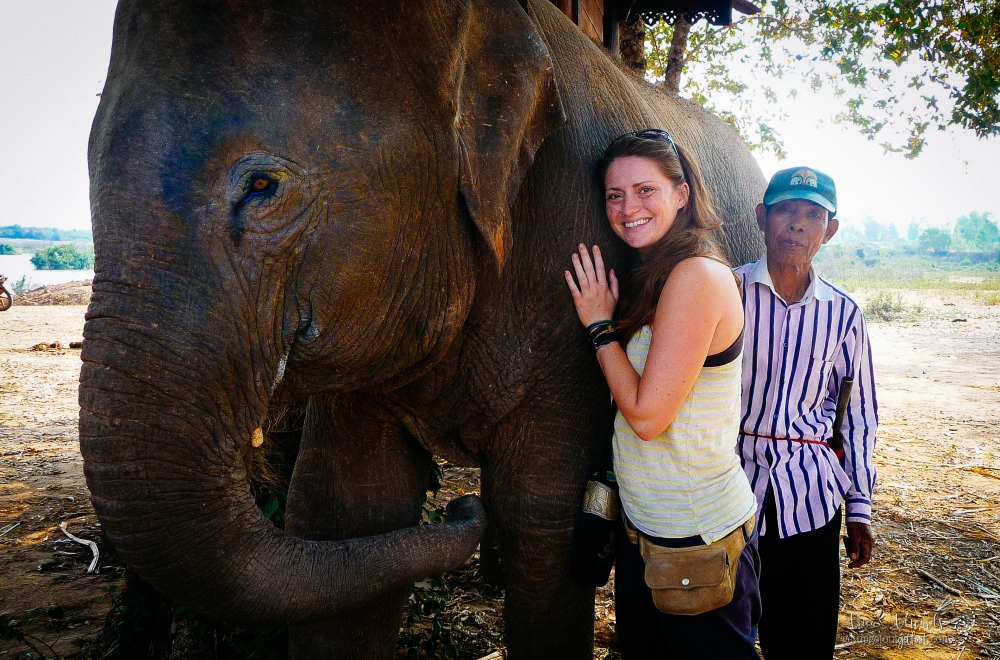
Surin Project Official Website: Here you can find full details and information about how to sign up for 1 – 8 weeks at the Surin Elephant Project.
Book Your Stay at the Surin Project: Click here for full details about what’s included for volunteers and how to book and prepare for your stay at the Surin Elephant Project.
Save Elephant Foundation (SEF): Founded by Sangduen “Lek” Chailert, the elephant whisperer herself, this Thai-based NGO is dedicating to protecting Asian elephants. SEF has flagship projects in Thailand, Cambodia and Malaysia.
Elephant Nature Park Official Website: Here you can find information about ENP in Chiang Mai. ENP is a sister project run by the same NGO and is a convenient alternative for those travelling in Chiang Mai with limited time. Volunteers at ENP can choose to visit for one day or longer.
A Day at the Elephant Nature Park: Here you can read about Kate’s first hand experience volunteering at the Elephant Nature Park in Chiang Mai.
Have You Worked in
Animal Conservation?
Have you ever volunteered at an animal conservation project that you loved? Or one that left you disapointed?
I’m passionate about animal conservation and I would love to help spread the word about recommendable programs, and those to steer clear of. Please comment with you experiences below!
Peace & eLOVEphants,
Erica 🐘💙
© Erica Edwards and getupgetoutgetlost.com, 2018. Unauthorized use and/or duplication of this material without express and written permission from this site’s author and/or owner is strictly prohibited. Excerpts and links may be used, provided that full and clear credit is given to Erica Edwards and getupgetoutgetlost.com with appropriate and specific direction to the original content.

That sounds amazing. What an awesome way to have so many up close and special experiences with elephants and the local people who are carrying for them.
LikeLiked by 1 person
Some of the most enriching months of my life 🙂
LikeLike
It sounds like you had an amazing time. That photo of you standing in front of the elephant is amazing! It’s a shame that so many tourists still do the elephant riding without knowing what goes on behind the scenes. Or at least, you hope they dont know!
LikeLiked by 1 person
I know, I honestly can’t understand how it’s still a “bucket list” option for so many people nowadays with so much information out there about what these poor creatures go through. My hope is that the more people who become aware of alternatives like the Surin Project, the less people will support the abusive elephant tourism industry. Thanks for reading!
LikeLike
This is a great post at least for me. I’ve been looking for infos about working in an animal Conservation, but didn’t really find enough infos. Thank you so much for sharing. I’ll try to contact them.
LikeLiked by 1 person
Great! Lots of links at the bottom of the post to find the right project for you 🙂
LikeLiked by 1 person
What an incredible opportunity and wonderful project to be part of. I’m sure its something you’ll take away with you for the rest of your life. Did you at any time feel danger or unease with the elephants? They are just big!
LikeLiked by 1 person
Great question! As a general response I’d say no, that I didn’t feel uncomfortable or ill at east during the project. That being said though, there’s of course the adjustment phase, the first time you step beside these enormous creatures, and I don’t think anything can prepare you for that feeling of being so tiny beside them. The Surin Project staff also do a great job from the getgo explaining how the animals are to be treated and respected and that it’s not a petting zoo. The photos of me very close to my beautiful Bai Fern were taken after a few weeks of me being there and with the first contact initiated by her 🙂
LikeLike
What an incredible experience. I think most travellers are now clued up to the terrible practice of animal tourism, so it’s nice to read something so positive. I love elephants, especially for their level of emotional intelligence. Beautiful creatures!
LikeLike
Volunteering at an elephant sanctuary is something I’d like to do some day. I love elephants, and I’d love to spend time with them!
LikeLike
Its so good to see lots of ethical elepahnt tourism projects these days in Thailand. When I went in 2010 this was more rare. Nice post.
LikeLike
Sounds like an amazing experience! Thank you for sharing!
LikeLike
First of all, thank you so much for raising awareness! I never knew about the Surin Project, but living among elephants for two months is one of those experiences that change you radically. I think we should all do more in terms of animal conservation, thank you for reminding us!
LikeLiked by 1 person
Thanks for reading! I think I was very lucky that my first ever trip abroad was a conservation volunteer trip to New Zealand at age 18. It really instilled me with the perception that we should always give back something to the beautiful destinations we visit, whether it be a friendship formed, a piece of art insired, or a more tangible form of giving back, like volunteering abroad 🙂
LikeLike
I love your beautiful writing about your experiences here. You took me with you so vividly when you spoke of the multi-sensory experience that comes from hearing the great beasts rumbling their way into sleep. It must feel such a great privilege for an animal to allow you to be close and at ease in their presence. Thanks for sharing the story of this project.
LikeLiked by 1 person
Thank you! A priviledge almost feels like an understatement… I don’t think there are words to describe the moment Bai Fern approached me for the first time and pressed her forehead on mine. It was such a truly ethereal experience, it gives me chills to recall it.
LikeLike
Unfortunately, I haven’t, but I am very passionate about preserving a local protected landscape where I live, that is not so protected anymore. I loved reading about your experience- the welcoming blessings, waking up to the elephants, elephant best friends… ❤ One of a kind experience!
I loved reading about your experience- the welcoming blessings, waking up to the elephants, elephant best friends… ❤ One of a kind experience!
LikeLiked by 1 person
Thanks for reading! It really was one of a kind. Which is the local landscape you’re passionate about preserving? I love learning about local conservation efforts.
LikeLike
It was amazing reading your post about the elephant project. What a fantastic opportunity to be around the beautiful animals. I would have died to have to see the abuse you witnessed. It breaks my heart even reading it. I hope your words and experience will be relayed to those who do not know any better and help rid this horrible tourist attraction.
LikeLiked by 1 person
While it was absolutely heartbreaking to witness, it was also one of the most impactful aspects of my experience. It really makes you realize WHY these projects are so important and inspires people to share their experiences with others. The Surin Project is very up front about this aspect of the project from the beginning so that volunteers are aware of the possibility, but really I don’t think there’s anything that can prepare you to see such ill treatment 😦
LikeLike
This looks beyond amazing and is on my to do list! I did conservation work with leatherback turtles in Costa Rica and loved it. I also love that the elephants sigh! How cute!
LikeLiked by 1 person
I’ve always wanted to work with turtles in central America! A good friend of mine runs conservation projects with turtles in Nicaragua and I’m hoping to join her sooner than later!
LikeLike
I love Elephants ! I had amazing experience in Narobi! Thank you for sharing about the Surin Elephant Project!
LikeLike
Thanks for reading. Did you volunteer with elephants in Naoirobi? I’ve yet to see an African elephant in person, though it’s certainly on my list!
LikeLike
It’s so refreshing to discover that there are such places in the world, where animals are given the respect and care which they deserve. It’s really sad to know that there are still places where elephants are used for circus or tourism. Unfortunately, the elephants are not the only animals victims of this type of tourism. Let’s just hope that more and more people will write and discover places like Surin Elephant Project and share their experience
LikeLiked by 1 person
I couldn’t agree more. Education and word of mouth are the best tools we have to try to combat the victims of animal tourism. There are so many people out there riding elephants who claim to “love them”, although the practice is pure torture. Organizations like Surin Project enable elephant lovers to experience closeness with these beautiful creatures while also allowing them to live a more peaceful existance.
LikeLike
First elephant sanctuary I’ve read of. This is very interesting. Not many people know of their treatment and I know of friends who get rides in Thailand that are told that they’re treated and cared for very well. You can stay there too? Nice! Lovely pics. Well done, lass!
LikeLike
Thanks for reading! Sadly there’s no such thing as ethical elephant riding, as it takes many years of abuse – including infant separation from the mother and a multiday beating called “the crush” which is used to break the spirit of the animal to make them submissive in order to train them 😦 One of the best parts about the Save Elephant Foundation’s elephant conservation programs is spreading this information so that others can make more informed decisions and avoid participating in animal abuse!
LikeLike
I love all animals and I find it so hard watching what happens to these animals to get them ready for people. I’ve been wanting to go to one of these sanctuaries for a long time and it’s on the top of my list when I eventually go to Thailand so thanks for bringing another one to my attention! It looks like an amazing place 🙂
LikeLiked by 1 person
You are going to have such an incredible experience! I highly recommend any projects sponsered by Lek’s Save Elephant Foundation as they’re very trustworthy! Sadly, there are a few fakes out there looking for tourist money over the wellbeing of the animals, so be sure to do your research! 🙂
LikeLike
What a sweet story! How long did you volunteer for? It sounds awesome and I’m so glad most places exchanged the elephant riding to a much better way to interact with them. Maybe one day I get to do it too
LikeLike
Aww what an unforgettable experience this must’ve been!!! It’s great to see more and more people becoming aware of animal cruelty and opting to help out by volunteering at conservations like this one instead of doing the rides. Great project to support!
LikeLike
Lovely pics, you seem to have had a great time. Feels so lively, I wish I would visit the camp and volunteer one day. Thanks for sharing this lovely blog.
LikeLike
Thanks for reading! I hope you find a similar experience on your travels 🙂
LikeLike
I appreciate your ideas and observations. This is unique information and every travel lovers should have to know about those things. All of your pictures and info are very helpful for all especially the animal lovers.Elephants are very cool and they are very easy to mannequate and they are very friendly. thanks for sharing it with us.
LikeLike
Thank you for writing this! I have always wanted to go to Thailand and see elephants but I have heard horror stories and so I have been a bit weary. Its great to hear from a trustworthy person that experienced this place. Thanks!
LikeLiked by 1 person
Thank you! You absolutely have to do research before visiting these types of places because there are so many untrustworthy sites. The best key of thumb is to check for places that are involved with SEF, the Save Elephant Foundation 🙂
LikeLike
Wow, what a powerful post Erica! Your description of the abuse elephants face at the hand of people for the sake of tourism made my chest feel tight. I’m glad you were able to be a part of the solution and the healing for these amazing animals.
LikeLiked by 1 person
Thanks for reading! Sometimes we can feel so helpless in the face of such a massive problem, but at least sharing my experience and encouraging others to avoid cruel elephant tourism may make a difference in someone’s decision to not ride an elephant. Even if one person changes their mind, it’s a step!
LikeLike
Wow, I had no idea this existed and now it’s all I want to do! Thank you for sharing, it sounds like it was an unforgettable experience 🙂
LikeLike
It truly was an incredible experience! I hope you’re able to visit one day 😊
LikeLike
This does seem like a beautiful experience I just wish they wouldn’t allow volunteers to touch the elephants when not necessary as that is not at all normal for these animals.
LikeLike
While they do allow elephant bathing (which some find controversial) volunteers are highly encouraged to give the elephants plenty of space and to observe from a distance, allowing the elles to mingle with their own. The featured image was a truly magical moment for me, as the elephant approached me during one of the daily walks in the forest and greeted me with her trunk. The mahout with whom I was living at the homestay was charged with caring for her and as I had already been there for a few months she and I had developed a rather lovely bond.
LikeLike
What an amazing experience! Would love to do the same next time I am in Thailand 🙂
LikeLike
I would absolutely recemmend it!
LikeLike
Hi Erica! Aren’t elephants the sweetest? I love that projects exist to now help the poor creatures that have been abused and can’t return to the wild. More education around the mistreatment faced by elephants in normal tourist traps is exactly what we need to stop them!
LikeLiked by 1 person
They truly are remarkable creatures. So intelligent and graceful! I can only hope that as more people become educated that there will be no more demand for elephant tourism and eventually not even elephant conservation projects – but rather for them to one day be able to live safely back in the wild.
LikeLike
Fantastic blog!!
Check out my blog too if you like
xxx
LikeLike